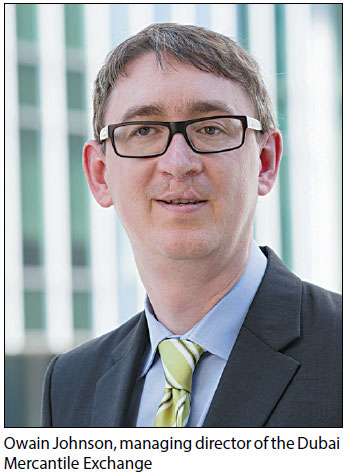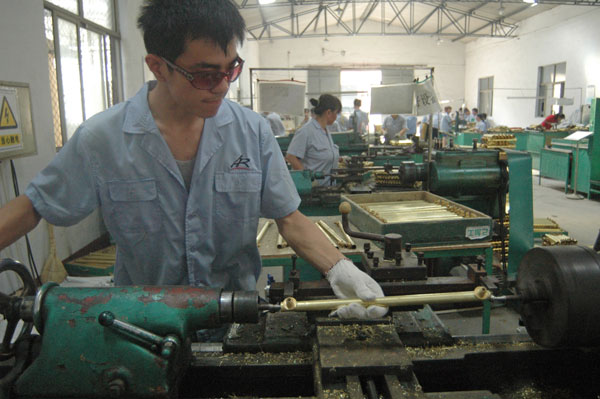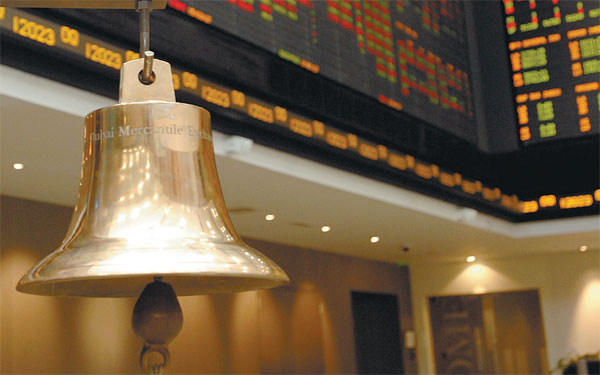Business lifts Dubai oil trades
Updated: 2015-08-07 09:22
By Cecily Liu(China Daily Europe)
|
|||||||||||
Chinese demand helps fuel changes in the way that transactions are done
Chinese oil companies' rapid switch of oil purchases from over the counter to exchange-based transactions has helped the eight-year-old Dubai Mercantile Exchange become a highly influential regional crude oil transaction center.
Within eight years, Chinese oil imports have grown to account for 70 percent of the physical delivery of oil traded on the Dubai-based DME, compared with about 40 percent three years ago.
|
Chinese oil imports have grown to account for 70 percent of the physical delivery of oil traded on the Dubai Mercantile Exchange. Photos provided to China Daily |
Such large purchases have made the DME's Oman crude contracts a regional benchmark, on par with Brent crude of London and West Texas Intermediate in New York.
Oman crude has also become the largest physically delivered oil-futures contract in the world, largely driven by China's high demand for oil. In comparison the Brent and the WTI are for crude oil more commonly traded as risk hedges.
"We are seeing an increase in activities from China, and we are very happy with the growing cooperation with Chinese traders, Bank of China and the Shanghai Futures Exchange," says Owain Johnson, managing director of the DME.
Johnson says the exchange is attracting a growing number of Chinese traders, especially after it established a Chinese-language website and a regional office in Singapore to more efficiently liaise with Chinese customers.
In November, Bank of China signed a memorandum of understanding with the DME to cover the financing of Chinese companies' purchase of oil from the exchange.
This agreement led to an announcement in July that Bank of China instituted a policy of providing letters of credit to Chinese firms buying from the exchange, which demonstrates its endorsement for the exchange's credibility. A letter of credit is an import finance instrument.
"Previously much of the oil trade on the DME was financed by Western banks, but for the first time Bank of China is stepping into this space to finance trade deals," Johnson says.
"It is often more economic for Chinese oil buyers to use a bank they already have a corporate relationship with, and working with Bank of China could also provide them with lower cost of financing and more logistic convenience."
DME has established a close relationship with Shanghai Futures Exchange and will play an important role in helping the Chinese exchange establish its own crude oil contract by sharing its expertise and introducing its customers to the Shanghai Futures Exchange.

In addition, the two exchanges will share marketing platforms and maintain trading transparency for their respective customer bases, Johnson says.
"China has become our biggest customer so we have a big influence on the oil price in China, and likewise Chinese buyers have a big influence on our crude oil contract price, so we have been exploring how to make trades more efficient," he says.
The Shanghai Futures Exchange has said that the new crude oil contract will be priced in renminbi and will be structured by combining the prices of several key crude oil grades that constitute China's oil imports, one of which will be Oman crude.
"China is the most important importer of oil in the marketplace and it's crazy that they don't have a benchmark contract for oil prices. The launch of the new contract in China will help Chinese traders to have more pricing power over crude oil," says Johnson.
With a crude contract in China, Chinese traders would be able to send a signal about their growing demand by increasing their purchase of the contract, which will in turn reduce crude oil prices. This increasing volume of demand is highly transparent because it is reflected on an organized exchange.
Without such a contract, the amount of crude oil Chinese traders demand would not be seen by the overall market, thus not contributing to determining the market price.
Johnson says the launch of the new Chinese crude oil contract will help increase trading volumes on the DME because the two contracts will help traders see arbitrage opportunities and execute trades to take advantage of the arbitrage.
Arbitrage means traders buy the cheaper contract and sell the more expensive one in order to pocket riskless return, as the underlying commodity of the two contracts is often the same.
Johnson says because the Middle East is a big exporter of crude oil, the Oman Crude contract is now seen as a reference price by oil exporters, and as China is a big importer its crude oil contract is likely to be seen as an import reference price.
"The fact that our contract is priced in dollars and the Chinese contract is priced in renminbi, and that one contract is an export benchmark and the other is an import benchmark means that our two prices will never be the same. The arbitrage opportunity will increase trade volumes," he says.
Historically, Brent crude contracts worked as export contracts and the WTI an import contract, and the relationship between the two has been a key influence on driving up trade volumes, he says.
Launched in 2007, the DME is a subsidiary of the US futures company CME Group (Chicago Mercantile Exchange & Chicago Board of Trade). Johnson says a key objective for the DME's founding was the launch of a new Asian crude oil benchmark that fills a gap in the market.
Johnson says the association with CME has greatly helped DME's growth, as CME has provided his team with its own trading platform technology, so the DME would not need to invest heavily into infrastructure at its founding stage.
From there on, it established credibility by consistent service provided to traders, which led to a gradual accumulation of liquidity.
Before, much of China's oil imports were bought over the counter, meaning individual companies would negotiate oil prices. Over-the-counter negotiations are much more complex than buying a crude oil contract on the DME, and given the lack of price transparency, junior traders often find it difficult to justify the purchase price to their managers.
Although Brent and WTI are open to foreign participation, a key problem with the later is that the US-produced underlying crude oil cannot be taken out of the country, meaning it is purely a tool for financial speculative trading or crude oil purchases by US firms.
Brent crude, produced in the North Sea, is now seeing its volume decreasing, meaning the future sustainability of Brent export faces uncertainty.
As much of the Asian markets' crude oil demand is already satisfied by the Middle East production, the launch of the Oman crude contract has fulfilled big demand in the market. Apart from Chinese buyers, oil companies from Japan, South Korea, Singapore and Malaysia are also big buyers of Oman crude, together making up about 30 percent of total trade.
Furthermore, the DME has focused heavily on physical delivery of oil by making sure the futures contracts match the physical delivery of the underlying crude, and this fits well with the Chinese government's objective to encourage the use of commodity trading for physical delivery as opposed to speculative trading.
This characteristic distinguishes the contract from the other crude oil exchanges, where a large volume of the trade is focused on the profit or loss at contract expiry, rather than the commodity changing hands.
"Setting up a physical exchange is very difficult because you need reliable supply, logistics and storage of the commodity, which means financial contracts are much easier," Johnson says.
Physical contracts are preferred by Chinese regulators, who consider financial contract trading to be too risky especially as Chinese banks and commodity trading firms are new to such business, compared to their Western counterparts. The rules that Chinese regulators have set for Chinese firms that trade on overseas exchanges are also more stringent.
Johnson says he looks forward to strengthening the working relationship with Chinese companies, exchanges and regulators. And as the DME grows his team will explore other commodity contracts, extending the scope of the exchange beyond crude oil.
cecily.liu@mail.chinadailyuk.com
( China Daily European Weekly 08/07/2015 page8)
Today's Top News
China asks further probe into MH370
'New Suez Canal' opened for ship traffic
China's property taxes coming soon
Seven arrested for trafficking women into sex slavery in China
ROK's ex-first lady begins
DPRK visit
Australia to continue search for MH370
Turkey says coalition to launch 'comprehensive battle' against IS
17 armed forces take part in Russia military contest
Hot Topics
Lunar probe , China growth forecasts, Emission rules get tougher, China seen through 'colored lens', International board,
Editor's Picks

|

|

|

|

|

|







